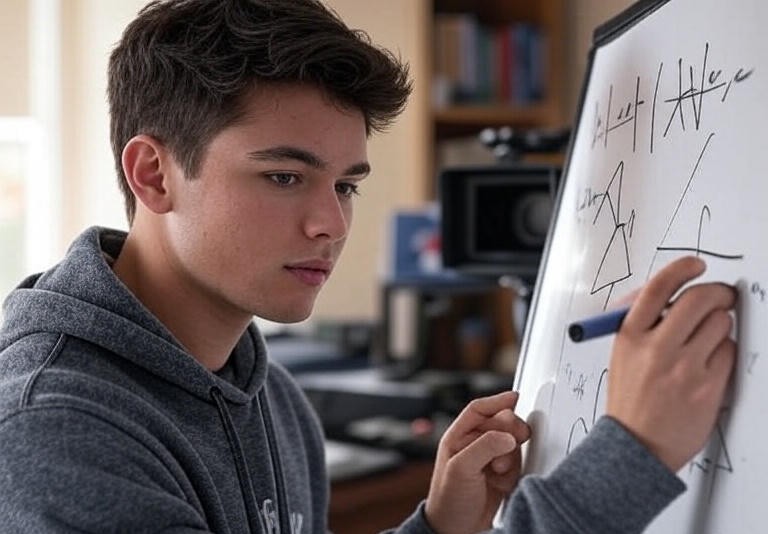
Filmmaking blends creativity with precision, and math is the quiet force behind the magic. In Chapel Hill, North Carolina, where academic excellence thrives alongside artistic ambition, Math II tutors are helping aspiring filmmakers build the analytical skills needed to succeed in the film industry. From crafting realistic visual effects to managing tight budgets, the connection between math and movies is undeniable. This article explores how these tutors empower students to navigate the technical and creative demands of filmmaking.
Math II covers critical concepts like algebra, geometry, and trigonometry, which directly apply to filmmaking. In Chapel Hill, a hub for education with institutions like UNC-Chapel Hill, a math II tutor Chapel Hill plays a pivotal role in preparing students for the industry. These tutors help students master equations and problem-solving, skills that translate to tasks like calculating camera angles or designing CGI animations. By fostering a strong mathematical foundation, they ensure students can tackle the technical challenges of film production with confidence.
The Math Behind the Movies
Every blockbuster relies on math to bring stories to life. Consider the visual effects in films like Avatar. Artists use geometric coordinates to map characters in 3D space, while trigonometry helps animate their movements. Linear algebra scales objects, making dinosaurs loom large or spaceships shrink into the distance. A Math II tutor in Chapel Hill teaches students to think logically, enabling them to understand these processes. “Math is the backbone of visual storytelling,” says a local tutor with over a decade of experience. “Without it, the seamless illusions we see on screen wouldn’t exist.”
Producers also depend on math to keep films on track. Budgeting requires precise calculations to allocate funds for sets, costumes, and special effects. A single misstep can derail a project. Math II students learn to analyze data and solve complex problems, skills that translate directly to managing a film’s finances. Tutors in Chapel Hill emphasize real-world applications, showing students how equations can balance a multimillion-dollar budget or optimize a shooting schedule.
Why Chapel Hill?
Chapel Hill’s academic environment fosters a unique blend of art and science. Home to top-tier schools and a vibrant creative community, it’s an ideal place for future filmmakers to grow. Math II tutors here don’t just teach formulas; they inspire students to see math as a creative tool. Through personalized lessons, they address individual learning styles, helping students who feel “bad at math” gain confidence. This tailored approach is vital for aspiring filmmakers who need both technical skills and creative freedom.
Key Skills Math II Tutors Impart
- Problem-Solving: Tutors teach students to break down complex problems, a skill used in editing or designing special effects.
- Spatial Reasoning: Geometry lessons help students visualize camera angles and set designs in three-dimensional space.
- Data Analysis: Understanding patterns and statistics aids in budgeting and audience research.
- Critical Thinking: Math II encourages logical reasoning, essential for scripting and storyboarding.
These skills don’t just help in math class but also shape careers. A student who masters trigonometry can calculate the perfect lighting angle for a dramatic scene. Another who excels in algebra might streamline a production schedule. By connecting math to real-world filmmaking, tutors make lessons engaging and relevant. “I love seeing students light up when they realize math isn’t just numbers, it’s part of the stories they want to tell,” shares a Chapel Hill tutor.
Bridging Math and Creativity
Filmmaking is often seen as a purely artistic pursuit, but math is its unsung hero. Animation, for instance, relies on millions of equations per frame to simulate realistic lighting or character motion. Tutors in Chapel Hill use examples from films to make math relatable. They might ask, “How would you calculate the trajectory of a superhero’s leap?” This approach sparks curiosity and shows students that math fuels creativity.
Confidence is another gift tutors provide. Many students start Math II feeling overwhelmed, but one-on-one tutoring changes that. In Chapel Hill, tutors create a supportive environment, helping students overcome fears and build resilience. This confidence carries over to filmmaking, where setbacks are common, and problem-solving is key. Whether it’s adjusting a budget or troubleshooting a visual effect, the analytical mindset fostered by Math II tutors prepares students for the challenges of the industry.
READ ALSO: Math in the Movies: How Hollywood Makes Numbers Exciting
Preparing for the Future
The film industry is evolving, and math skills are more important than ever. With advancements in virtual reality and AI-driven effects, filmmakers need a strong grasp of technical concepts. Chapel Hill’s Math II tutors are equipping students for this future by teaching them to think critically and adapt. They’re not just preparing students for exams but for careers where math and creativity intersect.
What makes Chapel Hill tutors stand out? Their ability to connect with students and make math meaningful. By showing how algebra or geometry applies to filmmaking, they inspire a new generation of storytellers. These tutors aren’t just teaching equations, they’re shaping the minds behind the next great film. As one student put it, “I never thought math could help me make movies, but now I see it everywhere.”
The journey from classroom to film set is paved with numbers. In Chapel Hill, Math II tutors are guiding students along this path, blending logic with imagination. For aspiring filmmakers, these lessons are more than academic, they’re the foundation of a career that brings stories to life. With every equation solved, students move closer to creating their own cinematic masterpieces.

